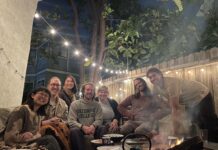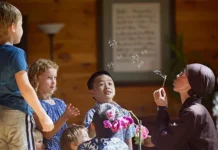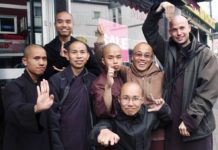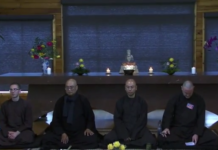By Sister True Dedication (Sister Hien Nghiem)
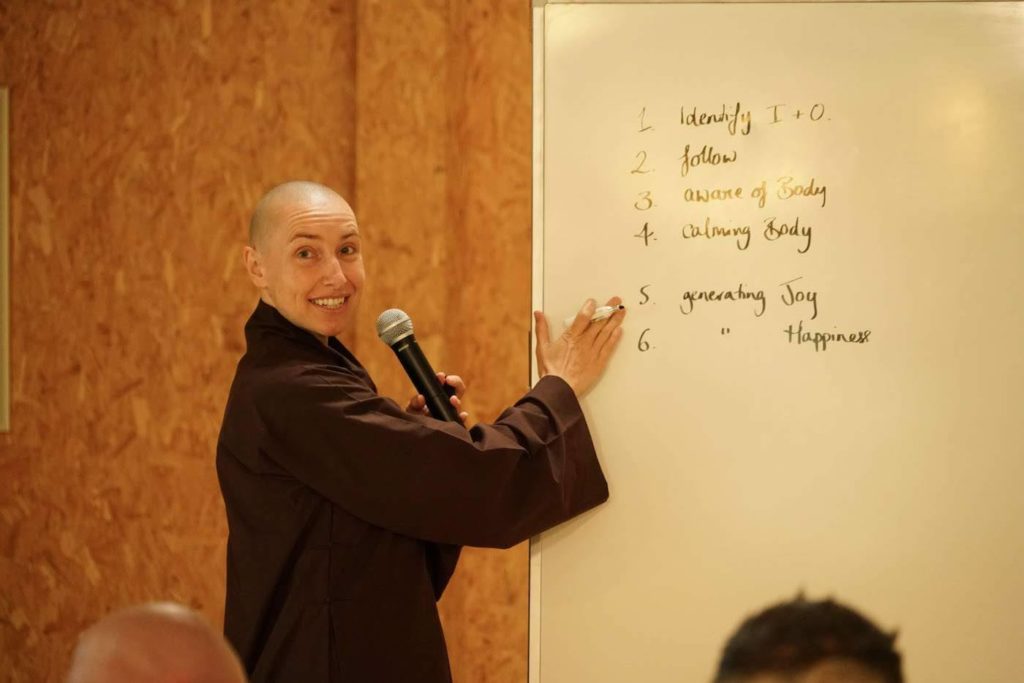
There is also the Bodhisattva who is ready to laugh and ready to cry. I am ready to laugh and ready to cry, but I am not sure I am a Bodhisattva [Laughter.] Can we live each moment fully? When there is suffering, can we shed a tear? Can we honor the pain we witness and allow ourselves to cry? Can we also allow ourselves moments of laughter? We have been given this life to live. It would be a pity if we didn’t allow ourselves to enjoy what moments the earth gives us to enjoy.
Sister Chan Khong is a wonderful Bodhisattva who is ready to laugh and ready to cry. I remember one time I had a chance to do some engaged activism work with her in 2009-2010. We had gone to European capitals like Geneva, Brussels, and Strasburg, and we had many days on the road. There were a lot of difficult meetings because we were trying to ask for help to protect some of our brothers and sisters whose safety was in danger. I was so impressed, and I learned so much from Sister Chan Khong on that trip.
First, I learned how she laser-beamed all her love at every single political person we met. Just unbelievable. She just went straight for their heart. You know those laser beams that go to the moon, but they are only 5 meters wide? That is what Sister Chan Khong’s love is like. In some of those meetings, she also cried as she shared some of the challenges of our brothers and sisters.
On the journey home, we weren’t sure if any of the things we had done were effective, but Sister Chan Khong likes singing. On the train home, she was singing to us and trying to teach us Vietnamese with Vietnamese children’s songs. Some of us thought: Wouldn’t it be fun if we played a practical joke on Sister Chan Khong?
Sister Chan Khong howled with laughter. I swear she was laughing so hard she was almost crying.
I don’t know why we thought of it, why we thought it was so necessary. Maybe we had had so much tension on the trip, so much fear. Most of us had never had to speak to parliaments or meet with politicians before. So, we played this trick on her. It involved a white lie, but she really believed it.
It was probably outside our precepts, but it seemed like a really good idea at the time. I will never forget the moment when we arrived at the Bordeaux Train Station, and we finally told her it was a joke. I can’t remember exactly what we had told her, but it was something about the form of transportation we would have to take from Bordeaux’s train station back to Plum Village. We told her it was a joke, and it was a bit hit or miss because we didn’t know if she would laugh or be really angry.
Sister Chan Khong howled with laughter. I swear she was laughing so hard she was almost crying. It was my best memory of the whole trip. This spirit that says there is something terrible going on, but we have to find ways to laugh. We have to find ways to feel close to each other and find ways to not take it too seriously. That laughter was healing and bonding.
In our communities, Sanghas, and workplace, there may be many Bodhisattvas all around us. Can we identify them? This person is offering this quality to the workplace or the project. This person is so quiet that they never say a word, but their quality of presence is such a contribution to the whole group. We need to identify our Bodhisattvas and appreciate them. Let them know that we know they are Bodhisattvas.
Sometimes I go around Lower Hamlet bowing to the sisters and say, Nam Mo Bo Tat. Then I say their name. Maybe they are working very hard in the office. Maybe they are working very hard in the kitchen. They may be working until the wee hours of the morning to clean the store. It all comes from the energy of love.
We are here, and we put our energy out in order to help people suffer less. That is why we do what we do even though concretely it comes down to these actions that look mundane; they don’t look sacred. But with the energy of mindfulness and love, they become sacred. The cooking is sacred. Coding for the website is sacred.
I want to share another thing about enjoying engaged action with Thay and Sister Chan Khong. One day, Thay wanted us to work on something. We were in the Lower Hamlet in his room. There were 5 or 6 of us there. He said, “I need you to do this thing.”
We said ok, and he gave us some ideas. Some of us tried to take notes and we said, “Okay, we are going to do what Thay said.” Okay, great. We were sitting there and heard the sound of the bell, which was very close by. It was very loud, and everyone came back to their breathing. He had called us in after walking meditation and after the Dharma Talk. The next thing was formal lunch together in the dining hall.
After the bell, we all made a move to stand up, but Thay said “No, No. You don’t need to eat.” Thay got up and said, “Oh no, the human body can go without food for several days.” I think some of the brothers and sisters who are in the hall right now were also in the room then. I don’t know if they remember this or not.
To be the one who is cooking with love is to be a Bodhisattva feeding those who are going hungry.
I guess we had been a bit too eager and were probably very hungry. So Thay left us there to work on this project and went to have lunch with the Sangha. A part of having action that is healthy and sustainable is that although we do need to eat, we do need to sleep, and we do need to rest and relax, sometimes there are times when we can skip these things and make a small sacrifice that is not too painful. But we do it together.
Another time we were walking late with Thay at his hermitage with Sister Chan Kong, and we were drafting some press release or something on that same project of trying to protect our brothers and sisters. We were a little absorbed in our work because it was quite complicated. So time when by and more time went by. It was a lazy day, and on lazy days if you were present helping Thay at the hermitage, you made sure he has something to eat.
Well, we were not very lazy and did not think at all about food. We were working very hard with computer screens and documents and printers everywhere. Thay walked through one time. And then he walked through again, and he smiled at us. We smiled, bowed back, and thought to ourselves, “Ah, aren’t you proud of us, your children, working hard.” And he walked by again and again. Some time later, Thay appeared at the door and said, “Dinner is ready.” We felt ashamed because we suddenly realized at that moment our complete failure. But there is something to learn about that. We need to bring the energy of love and care to each other when we are working hard. To be the one who is cooking with love is to be a Bodhisattva feeding those who are going hungry.
Maybe we can have a sound of the bell. The bell is invited, and everyone enjoys their breath.
[After the bell, Sister True Dedication turns to the white board to write and gesture.]
When we act in the world, that acting arises from the way we are thinking about things, the way we are speaking and the physical action of the body. The Bodhisattvas are helping us to do these things beautifully. We have been learning in the presentations on Beginning Anew, the practice of loving Speech and Deep Listening, and we all have made a lot of progress on these three (pointing to the words thinking, speech and action) already.
This [thinking, speech and action] is what we can call our triple action, also known as karma. Karma means action, what we produce in this lifetime. This continues to resonant. Sometimes we see how our action of speech can either cause healing or an escalating cycle of disaster. Our action resonates through space and time. When our physical body disintegrates, it is our actions that continue us. It is the ground on which we stand. We can speak about right thinking, right speech, and right action.
We can also talk about Right Mindfulness, Right Concentration, Right Insight. It means that there is also wrong thinking, wrong speech and wrong action. Wrong thinking is thinking that is not aligned with the concept of interbeing. “That’s your problem.” “That’s your problem, not mine.” But with the insight of interbeing, the problem of our colleague, our friend, our family member, our mother, our father, that is also our problem because we inter-are.
Right thinking also has something to do with the inclination of our mind. We can be the master of our mind, the rider of our horse, the horse of our mind. We can choose where to rest our mind: resting it on thoughts that are positive or thoughts that are negative, that go in the direction of helping there be more well-being, or that keep us stuck in ill-being.
We need to ask ourselves: What is most important to me?
The path to well-being involves cultivating our mind and good thinking. We don’t repress the negative thinking. If we have a feeling of anger, we embrace our anger, look deeply into it, and calm it so we can get an insight about it. We look deeply into our despair and learn how to cultivate the opposite, which is hope. There is a lot of suffering in the world. We just need enough of a homeopathic dose to cultivate. This is a lot like gardening our mind so that the speech we produce will be helpful rather than do more harm, and so that our actions can be based on love, joy, and compassion. If our action is based on panic or self-defense, it may not exactly come from the right place in us; it may not be truly sustainable.
We have the language of climate crisis or planetary breakdown. These are strong words. If we have a sense that everything is broken, and that time is running out, the energy of panic may not help us have deep, long lasting, sustainable action. Instead of operating from a place of fear, we see the truth. We name the truth; we know the truth, but we want to operate from a place of loving the earth, and wanting to protect the earth and everyone and all species on the earth. It is something we want to do together.
The most powerful kind of action is collective action. Thay taught ways to work together and collaborate with others. These are called the Six Harmonies or togethernesses. This might be your housemates, your activist group, your local Sangha, or even your colleagues at work. Or even just your fellow dreamers. Maybe you are in a theater company or other affiliated group.
How can you stay bonded and in harmony? How can you harmonize? First of all, you have to show up. Physical presence. If we organize a party and no one shows up, we don’t feel very happy. If we organize a protest and no one shows up, we don’t feel happy. If we organize a rotation team for the monastics and our rotation team monastics don’t show up, we don’t feel happy. Showing up.
The next one is that we share our insights and views, and we do this in a very particular way. In the Buddhist tradition, the way we do this is not to impose our views on others but to try to hear all views, a diversity of views. To tolerate different ways of looking and seeing things and then arrive at a collective insight or harmonious consensus of all the different views. The third is thinking or sharing from our heart/mind. There is one word for heart and mind in Vietnamese and Chinese.
This is what we do in Dharma sharing. We are sharing our deepest truths and experiences. It is a way to become intimate with each other. It is a way to build trust and solidarity. What is really going on for me? What are my deepest dreams? The fourth is harmonious speech. We make a commitment to each other to guard our speaking and practice restraint so as not to create disharmony. We may express our view but then we let go; we don’t fight for it. If we have a strong emotion, we go out for a 10-minute walk and then come back and express ourselves calmly.
This is how we cultivate this in Plum Village. A lot of harm can be done with speech that is not harmonious. The fifth is sharing resources. If we live with other people, we know that this is sometimes a place of negotiation. The more we can share, the more we can be in harmony. We can share food and the electricity bill. If you are in a Sangha, you can share the bell and cushions. Having shared resources that you hold in common is very bonding.
It is a way to practice interbeing. Not me or mine but more things that are shared. And finally, we share values or ethics. For many of us, this is the Five Mindfulness Trainings. For monastics, it is our monastic precepts. We have a code of conduct we all agree to follow that establishes boundaries as we go in the direction of goodness.
If we want to realize that dream and work with others to realize that dream, we have to be very clear about how we spend our time.
There are two more to discuss: Right Livelihood and Right Diligence. I hope all of you on this retreat have had a chance to reflect on what is most important to you. What are your deepest values? How would you like to live your life? How would I like to live my life? We need to ask ourselves: What is most important to me? I have this one life. What am I going to do with it? All of us need to have a direction, an aspiration. A deep sense of what we want to contribute and the direction we want to go in. This is called volition.
You will see it on your Five Mindfulness Training certificate. It is one of the four nutriments or fuels that sustain us. It is a source of energy. Volition or aspiration. We see the suffering in the world. We see the suffering in ourselves and our loved ones, and we want to do something about it. If we don’t do something about it, we go crazy. Each one of us is a different kind of Bodhisattva, each one different from the next, and we all have something to contribute. We have to find out what it will be. What will be my piece in this? Our deepest desire is something we have to identify and nurture and cultivate.
We have to have a clear sense of what you are here to do, why it is so important to you, and whom you want to help. Maybe we cannot help everyone but whom would we most like to help. And our volition, our aspiration, is very important during difficult moments. It carries us through the obstacles. When we have our own suffering inside—our own personal human suffering—when we have our bigger aspiration, it helps to get us out of the pit. I have so much to do in this life.
There is something I can do with this body. I will not be stuck in this pit. I will get myself out so I can help others and the world. We need this strong volition, this strong aspiration. The Bodhisattva of volition is Ksitigarbha. Ksitigarbha is a fearless and perseverance in realms of suffering and darkness in our own minds, in society and in the world. You can invoke his name. You can generate that energy in you of fearlessness and perseverance.
Everything is possible. When we know what we want to do, it is very easy to choose our right livelihood. Right Diligence means it’s a training. It is not enough to just have a dream. We need to have a dream, but that is not enough. We have to train ourselves to put our dream into action to realize it. It is best to realize it with others.
With Right Diligence, we become aware of many things. What environment do I need to nurture myself and my dream, my aspiration? Am I in a toxic environment where I work, where I live, where I hang out with people, where I go to spend my free time? Is it watering seeds of aggression, violence, fear, or despair in me? Or is it nourishing my seed of confidence, hope, and community?
Right Diligence means we have to be honest with ourselves about what kind of seeds we are watering and to water those that go in the direction to help us be the kind of person we want to be. Right Diligence has something to do with how we spend our time. We have a dream and it might be a very big dream. If we want to realize that dream and work with others to realize that dream, we have to be very clear about how we spend our time.
It is the Bodhisattva Ksitigarbha of Great Aspiration who switches off Netflix. He is the one who closes the YouTube window. We have something better to do with our time; we need all our energy, all our mental clarity, all the space. We need conserve our energy for that which is most important for us to do. We need to be very honest about what is watering our seeds of fear, anxiety, and restlessness.
This is the Path of the Wise Ones. This is what they are offering us. There is another word for Wise One: the Wizards’ Path. Maybe we need a miracle. Maybe we need many miracles in whatever our field of action even in relationship to ourselves, our family, or the world. I think that the wizards can help us make miracles.
Today is the last day of our retreat. It is a day to continue to savor every moment. Let us enjoy every step that we take, every breath where we are at peace and fully present. Let us enjoy really feeling connected to each other this moment. Only once! Just this moment is a happy moment. We have one more Dharma sharing with our intimate circles.
Maybe in our Dharma sharing we can ask ourselves: Have I been able to touch a moment of deep peace this retreat? Have I had a little glimpse of the ultimate and what the ultimate means to me? How did that moment come about? You can share that with one another and harvest some of the magic of this retreat. You can also ask the question: what one thing would I like to commit to do and change in my life, so I can have more moments like that when I go home? What would it take to put that in place? What conditions would I need to set up so I can have those kinds of moments?
Thank you very much for listening to this talk that we co-created. Thank you for smiling back to me. I have Irish ancestors, so I would like to offer you a blessing before we enjoy three sounds of the bell. You may like to close your eyes.
This is by a wonderful Irish poet, John O’Donohue
May the nourishment of the earth be yours
May the clarity of light be yours
May the fluency of the ocean be yours
May the protection of the ancestors be yours
And so may a slow wind work these words of love around you, an invisible cloak to mind your life.
Thank you.
The first half of Sister True Dedication’s Dharma talk during the Wake Up 2019 retreat can be watched on YouTube here.

